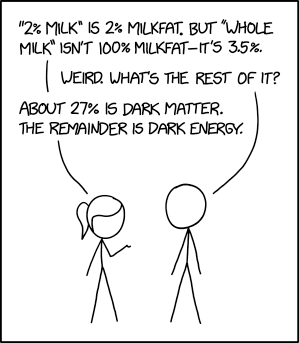your body and vit d
 Source: XKCD #2216 by Randall Munroe
Source: XKCD #2216 by Randall Munroe
Got Milk?
So in recent news, I got my annual blood panels done (please do your annual blood panels, it's good for your health) and it turns out that I have considerably low Vitamin D levels.
Whomp.
What the heck is Vitamin D? As someone who has done little in the biological world, vitamins and minerals (they're not rocks, they're minerals!) are not something I understand. All I know is that it's in milk, Sunny D (why?), and sunlight.
Actually, the above is not true (well not completely true). It turns out dairy products, oily fish, and egg yolks contain the dietary form of Vitamin D. Vitamin D is also naturally produced by your skin when it encounters ultraviolet B radiation from the sun by converting cholesterol.
Guess who's lactose intolerant and avoids the sun? Folks like me. Asian folks are more prone to Vitamin D deficiency in the West because of "low Vitamin D intake, relatively high adiposity, sun exposure avoidance and wearing of a covered dress style for cultural reasons."1.
Well, ok so you're not drinking enough milk. So what?
It turns out Vitamin D plays an important role reducing insulin resistance, reducing bad cholesterol, and improving your overall mood health - not just for strong bones 2. Consequentially, that means helping you maintaining a health weight, preventing heart attack and stroke, maintaining a healthy liver, and keeping you from being depressed.
Anyways, this is what I'm going to do:
- Go out and get sun exposure (responsibly). Having lived in Colorado for several years and living at a higher altitude, being outside for a short amount of time meant I got significant UV exposure as opposed to living closer to sea level now - this means I need to be outside longer without sunscreen to get as much UV exposure.
- Eat healthy sources of Vitamin D that don't upset my gut. Oily fish like salmon, egg yolk, mushrooms. Fish oil supplements are widely suggested. My friends have got me on Fairlife (Chocolate) which is a lactose-free protein drink that has high Vitamin D content.
- Exercise and sleep well.
Anyways - hope that was enlightening, it sure was for me!
It should be obvious, however, please note that I am not a doctor, nutritionist, or health professional. You should do your own research and talk to professionals about your own health and wellness. This is not medical advice and should not be taken as such.